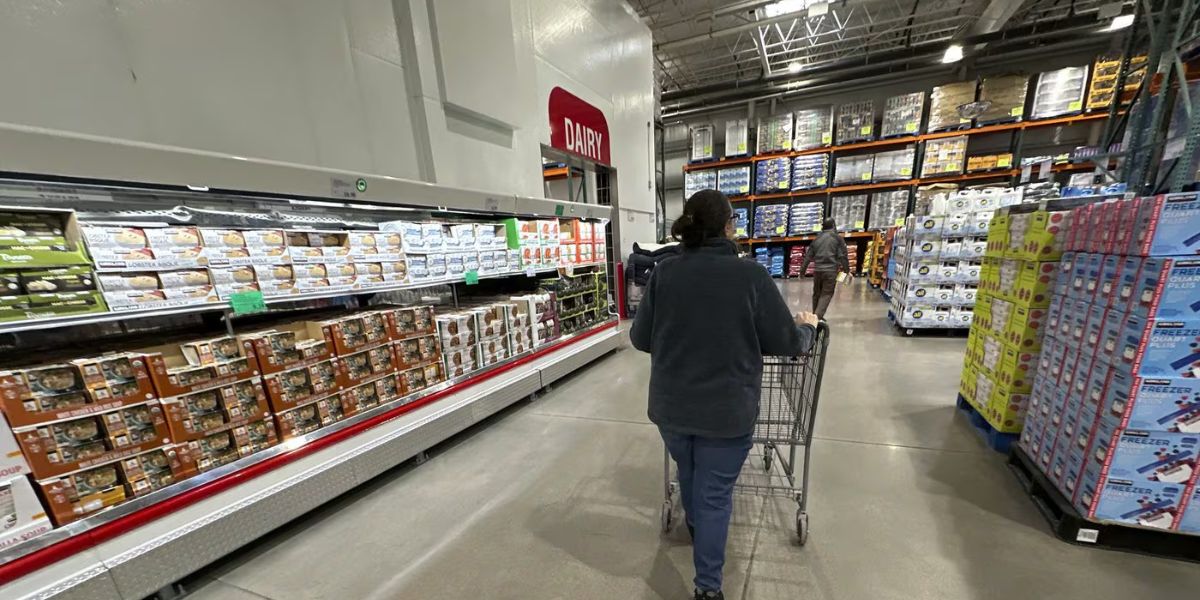American consumers felt worse about the economy this month compared with May and were bracing for a potential recession, largely due to concerns over President Donald Trump‘s tariff policies.
The Consumer Confidence Index, a survey measuring Americans’ sentiments about the economy and their financial situation, dropped to 93 in June, down 5.4 points from the previous month, marking the second-lowest level since February 2021, the Conference Board, a nonprofit think tank, reported on Tuesday.
The sudden downturn came as a surprise to some economists, who had expected further growth following May’s modest uptick, which came after the index plunged to 86 in April—the lowest reading since May 2020 in the depths of the COVID-19 pandemic.
Stephanie Guichard, senior economist at the Conference Board, noted in a statement that June’s decline in consumer sentiment wiped out almost half of May’s gains and was “broad-based across components, with consumers’ assessments of the present situation and their expectations for the future both contributing to the deterioration.”
What’s more, the confidence slump cut across all age groups and almost all income levels, and it was shared by all political affiliations, with the largest retreat seen among Republicans.
Consumers’ write-in responses to the survey revealed that Trump’s “Liberation Day” tariffs on foreign imports remained at the top of respondents’ minds and were often linked to concerns about their negative impacts on the economy and prices.
Additionally, the share of survey participants expecting a recession over the next 12 months edged up in June and remained above 2024 levels.
Notably, however, the Expectations Index—based on consumers’ short-term outlook for income, business, and labor market conditions—slipped 4.6 points, to 69, well below the threshold of 80 that typically points to a recession ahead.
More than a quarter of respondents said they expect job opportunities to dry up in the next six months, down slightly from 26.2% in May.
June marked the sixth consecutive month of weakening consumer sentiment toward the job market, although the reading remained in the black following a better-than-anticipated jobs report.
Inflation and high prices were another key concern cited by consumers in June. However, there were a few more mentions of easing inflation compared with May. This reflects a cooling in consumers’ average 12-month inflation expectations to 6%, down from 6.4% in May.
What does it mean for the housing market?
In a worrying sign, purchasing plans for homes declined, with a greater share of consumers saying they were on the fence about plans to spend money on big-ticket items overall compared with the previous month.
“Recent declines in consumer confidence add to the headwinds already facing this summer’s buying and selling season,” says Realtor.com senior economist Jake Krimmel.
On the buyer side, demand has already softened under the weight of persistently high mortgage rates stuck in the high-6% range. Yet despite easing demand, list prices have held steady, with the national median price in May coming in at $440,000—virtually flat since spring 2022.
“Confidence has fallen, especially among higher-income households, and that’s holding the summer market back,” says Krimmel. “Even beyond mortgage rates, buyers are expressing discomfort and pessimism about the broader outlook, which makes them less likely to take on a major financial commitment like a home purchase.”
Ironically, this growing reluctance comes just as the market is becoming more balanced, with the share of sellers offering price cuts steadily growing. At the same time, most sellers remain unwilling to adjust their expectations, choosing instead to wait for a better offer rather than negotiate.
“Altogether, this suggests a summer in a holding pattern: one where both buyers and sellers are increasingly deliberate, cautious, and willing to sit on the sidelines or wait one another out until conditions improve,” sums up Krimmel. “The result is a market that’s more balanced on paper, but emotionally and economically stalled.”
Alternative outlook presents a rosier picture
However, the bleak economic outlook was not universal, as evidenced by the University of Michigan’s sharply contrasting consumer confidence index released on Friday.
The survey, which covered a period from May 23 to June 23, found that Americans felt significantly more optimistic about the economy, with the index rising to 60.7 in June, up from 52.2 in May.
In a mirror image of the Conference Board’s results, the University of Michigan’s survey found that consumer sentiment improved across the entire political spectrum and Americans’ tariff-related fears eased somewhat.
It’s important to note, however, that June’s upbeat results followed a 29% plunge in the first four months of 2025, leaving the index stuck at its lowest-ever reading for two consecutive months, reported Bloomberg. Historically, a drop this precipitous and fast has almost unfailingly signaled a coming recession.
Joanne Hsu, director of the University of Michigan’s Surveys of Consumers, stressed that despite June’s gains, sentiment remains about 18% below December 2024, and consumer views remain “broadly consistent with an economic slowdown and an increase in inflation to come.”
Speaking to Bloomberg before the release of the June survey results, Hsu issued a stark warning.
“When all the signals are pointing the same way, I think we need to take the consumer seriously,” she told the outlet. “It’s just really dangerous to overlook.”




